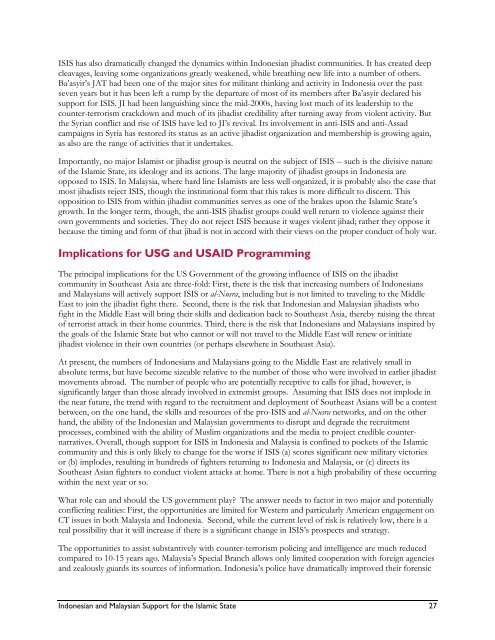INDONESIAN AND MALAYSIAN SUPPORT FOR THE ISLAMIC STATE (FINAL REPORT)
CVE_IndonesianMalaysianSupportforISIS
CVE_IndonesianMalaysianSupportforISIS
You also want an ePaper? Increase the reach of your titles
YUMPU automatically turns print PDFs into web optimized ePapers that Google loves.
ISIS has also dramatically changed the dynamics within Indonesian jihadist communities. It has created deep<br />
cleavages, leaving some organizations greatly weakened, while breathing new life into a number of others.<br />
Ba’asyir’s JAT had been one of the major sites for militant thinking and activity in Indonesia over the past<br />
seven years but it has been left a rump by the departure of most of its members after Ba’asyir declared his<br />
support for ISIS. JI had been languishing since the mid-2000s, having lost much of its leadership to the<br />
counter-terrorism crackdown and much of its jihadist credibility after turning away from violent activity. But<br />
the Syrian conflict and rise of ISIS have led to JI’s revival. Its involvement in anti-ISIS and anti-Assad<br />
campaigns in Syria has restored its status as an active jihadist organization and membership is growing again,<br />
as also are the range of activities that it undertakes.<br />
Importantly, no major Islamist or jihadist group is neutral on the subject of ISIS -- such is the divisive nature<br />
of the Islamic State, its ideology and its actions. The large majority of jihadist groups in Indonesia are<br />
opposed to ISIS. In Malaysia, where hard line Islamists are less well organized, it is probably also the case that<br />
most jihadists reject ISIS, though the institutional form that this takes is more difficult to discern. This<br />
opposition to ISIS from within jihadist communities serves as one of the brakes upon the Islamic State’s<br />
growth. In the longer term, though, the anti-ISIS jihadist groups could well return to violence against their<br />
own governments and societies. They do not reject ISIS because it wages violent jihad; rather they oppose it<br />
because the timing and form of that jihad is not in accord with their views on the proper conduct of holy war.<br />
Implications for USG and USAID Programming<br />
The principal implications for the US Government of the growing influence of ISIS on the jihadist<br />
community in Southeast Asia are three-fold: First, there is the risk that increasing numbers of Indonesians<br />
and Malaysians will actively support ISIS or al-Nusra, including but is not limited to traveling to the Middle<br />
East to join the jihadist fight there. Second, there is the risk that Indonesian and Malaysian jihadists who<br />
fight in the Middle East will bring their skills and dedication back to Southeast Asia, thereby raising the threat<br />
of terrorist attack in their home countries. Third, there is the risk that Indonesians and Malaysians inspired by<br />
the goals of the Islamic State but who cannot or will not travel to the Middle East will renew or initiate<br />
jihadist violence in their own countries (or perhaps elsewhere in Southeast Asia).<br />
At present, the numbers of Indonesians and Malaysians going to the Middle East are relatively small in<br />
absolute terms, but have become sizeable relative to the number of those who were involved in earlier jihadist<br />
movements abroad. The number of people who are potentially receptive to calls for jihad, however, is<br />
significantly larger than those already involved in extremist groups. Assuming that ISIS does not implode in<br />
the near future, the trend with regard to the recruitment and deployment of Southeast Asians will be a contest<br />
between, on the one hand, the skills and resources of the pro-ISIS and al-Nusra networks, and on the other<br />
hand, the ability of the Indonesian and Malaysian governments to disrupt and degrade the recruitment<br />
processes, combined with the ability of Muslim organizations and the media to project credible counternarratives.<br />
Overall, though support for ISIS in Indonesia and Malaysia is confined to pockets of the Islamic<br />
community and this is only likely to change for the worse if ISIS (a) scores significant new military victories<br />
or (b) implodes, resulting in hundreds of fighters returning to Indonesia and Malaysia, or (c) directs its<br />
Southeast Asian fighters to conduct violent attacks at home. There is not a high probability of these occurring<br />
within the next year or so.<br />
What role can and should the US government play? The answer needs to factor in two major and potentially<br />
conflicting realities: First, the opportunities are limited for Western and particularly American engagement on<br />
CT issues in both Malaysia and Indonesia. Second, while the current level of risk is relatively low, there is a<br />
real possibility that it will increase if there is a significant change in ISIS’s prospects and strategy.<br />
The opportunities to assist substantively with counter-terrorism policing and intelligence are much reduced<br />
compared to 10-15 years ago. Malaysia’s Special Branch allows only limited cooperation with foreign agencies<br />
and zealously guards its sources of information. Indonesia’s police have dramatically improved their forensic<br />
Indonesian and Malaysian Support for the Islamic State 27


